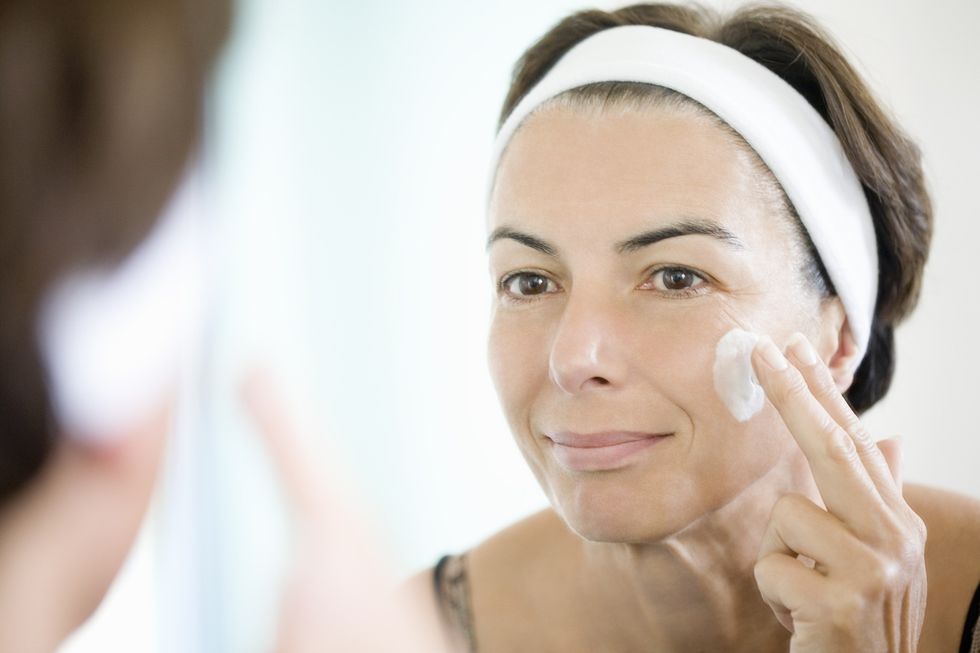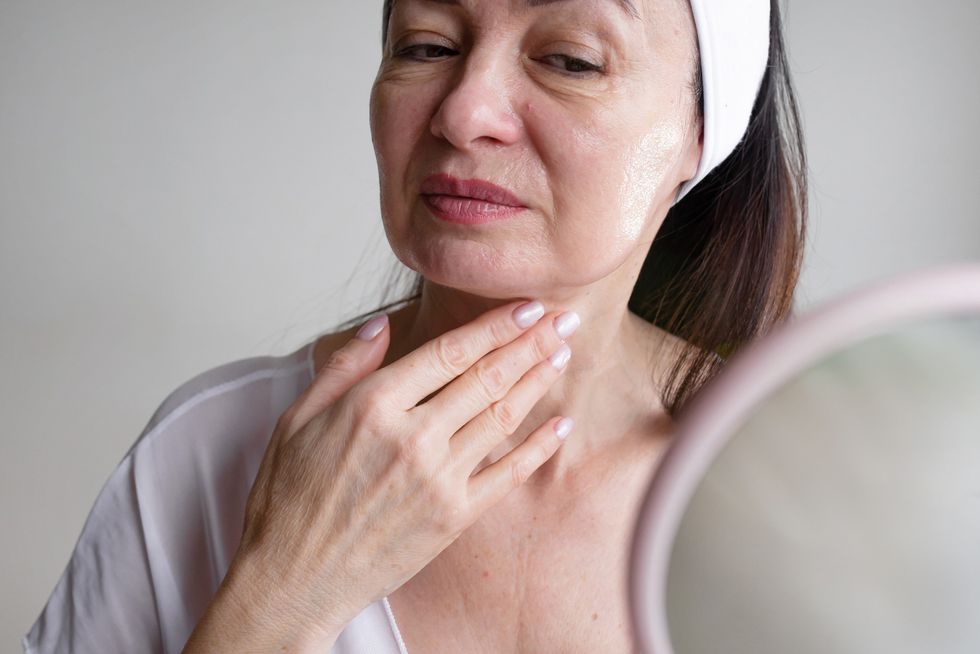Most important skin care practices for your 40s, 50s, 60s and 70s to ‘prevent signs of ageing’

While maintaining a youthful look is partly down to genetics – and a little bit of luck – there are plenty of things women can do to stave off and reduce the inevitable signs of ageing.
From magic concealer tricks to healthy lifestyle habits to the perfect over-50s haircut, the possibilities are endless. An effective skin care regime is also non-negotiable.
GB News spoke exclusively to a skin care expert about how ladies can support their skin as they age.
Absolute Collagen’s aesthetic doctor, Dr Sophie Shotter, explained the importance of “refreshing your skin care routine regularly”, although she claimed 43 per cent of those aged 55 to 64 have never done it.
The expert said: “Just as you may need to adapt your exercise routine or diet with age, the same needs to be done for your skin care routine.

Women in their 40s were advised to invest in ‘nourishing’ products such as night cream
GETTY IMAGES
“Your skin undergoes various changes throughout your life, which can be influenced by environmental factors like sun exposure, stress and pollution, as well as the natural process of ageing.
“So, while it is important to build a sustainable routine that works for your skin, it is also key to make sure your routine evolves to address these changing needs.
“Improving your knowledge of the changes that happen to your skin at each age is a great first step in understanding what you may be missing from your current skin care routine. Having this long-term view will also help when it comes to preventing signs of ageing.”
20s
Dr Shotter said: “Your 20s is the perfect time to start curating a skin care routine that works for you.
“If you didn’t in your teens, now’s the time to start wearing SPF. Daily use of SPF is essential for protecting your skin from harmful UV rays and keeping any premature signs of ageing at bay. Opt for an SPF factor 30, which will block out the vast majority of UV rays (97 per cent) or above.”
Choosing products that contain active ingredients is also effective – think hyaluronic acid and niacinamide to “lock in moisture and create a barrier for the skin” and vitamin C to “brighten” and boost collagen production.
The doctor continued: “At this age, skin care issues still vary between people, so it is important to tailor your routine to your main concerns. For some, this may be acne-prone skin, and for others, it may be your skin type transitioning from more oily to combination or dry.
“Choose products that are right for you, and try not to be swayed by what is trending or hot right now.”
30s
“Now you’ve entered your flirty 30s, you’ll likely notice some subtle signs of ageing,” Dr Shotter advised.
“While these are lovely reminders of the last few decades, you may want to start tweaking your skin routine to tackle those early signs and boost collagen production.”
One active ingredient to look out for is vitamin A (derivatives are known as retinoids) to “diminish the appearance of fine lines and wrinkles and improve the elasticity of your skin”.
“Slowly introduce retinoids into your routine once a week, using a low percentage to start and building up to applying a few times a week,” the skin care guru advised.
She concluded: “Your 30s are a fantastic time to start using an eye cream, which will help you to nourish the thinnest and most sensitive part of the face – the undereye.”
40s
The expert told women: “As you enter your 40s, your skin will likely experience quite a few changes. Often, this is when our skin starts to droop, thin, dry and feel more sensitive.
“While this can be a difficult transition, it is perfectly normal at this age – especially for those who are approaching or are in perimenopause.”
Dr Shotter stressed the importance of maintaining adequate hydration. Drinking enough water is essential, but it’s also good to supplement this with hydrating serums and “nourishing” products such as night cream.
The skin guru explained: “Night creams are often thicker and more hydrating than your everyday moisturiser, which can help your skin repair and feel replenished while you sleep.”
Offering a word of warning to women in their 40s, Dr Shotter said: “While harsh exfoliants should be avoided at any age, your skin becomes thinner in this decade, so it’s important to only use a light exfoliant a few times a week.
“This means avoiding any facial scrubs, as they are more likely to irritate than do any good. Continue to use exfoliating acids, but be mindful that you may need to drop down to using them only once or twice a week – especially if you notice your skin becoming more sensitive.”
The expert also suggested having regular face and neck massages, explaining that as the body’s lymphatic system slows down, there’s a risk of “facial puffiness or swelling”.
“Consider booking a facial every couple of months, or simply try at home with a gua sha tool or your fingers,” she advised.
50s and 60s
Dr Shotter stated: “In these decades, you will likely continue experiencing the natural changes to your skin that come with ageing.
“But the good news is that now you should have an understanding of what does and doesn’t work for your skin.
“So, when it comes to adding new ingredients or products into your routine, focus on targeting specific concerns.”
For those who are noticing more and more sagging – particularly on the neck – treating this area with a neck and décolletage cream is a cost-effective, low-risk option.
Go for a product that “promotes skin elasticity and collagen production”, the doctor advised, “as this will help to reduce neck lines and firm your neck skin”.
70s
“Your 70s are the time to go back to basics with your skin care routine,” Dr Shotter stated.
She explained: “At this age, your skin is much more sensitive, so it is recommended that you go completely fragrance-free, avoiding any products that might irritate the skin.
“Pare back what you apply daily, focusing solely on locking in moisture to your skin and keeping it super hydrated.
“Also, avoid using water that is too warm or any abrasive cloths or products.”
LATEST DEVELOPMENTS

In your 50s and 60s, invest in a neck and décolletage cream to ‘reduce lines and firm skin’
GETTY IMAGES
A second skin guru weighed in on how women can take care of maturing skin by harnessing the power of bakuchiol.
Cosmetologist-aesthetician for OnSkin, Valerie Aparovich, told GB News: “Around the ages of 35 to 40, your skin care regimen should be adjusted to address evolving skin needs and concerns.”
As the skin loses its firmness and elasticity, develops fine lines and wrinkles and becomes drier, many women go down the retinoid route. Retinoids stimulate the production of collagen and blood vessels, fade age spots and soften the skin.
However, there may be a gentler alternative out there, as retinoid users often report dryness, redness and irritation.
Valerie said: “Here’s where bakuchiol comes into the spotlight – a gentler, plant-derived functional analog of topical retinol.
“Natural bakuchiol is shown to induce similar gene expression within the skin, being nearly as effective in combating the signs of aging as synthetic retinoids. It promotes skin renewal and rejuvenation processes by stimulating cell turnover and the production of new structural collagen proteins, resulting in firmer, smoother and more resilient skin texture, faded fine lines, and wrinkles becoming more surface-based.
“Bakuchiol also helps improve complexion-related concerns like dullness and dark spots, making the skin appear refreshed, brighter and more radiant.”
The expert added that it’s brimming with antioxidant properties, “so it helps neutralise free radicals and alleviate oxidative stress”.
Before incorporating a new skin care product into your routine, it’s always best to consult a dermatologist or other expert who can offer tailored advice.
If you’re choosing between bakuchiol and retinoids, bakuchiol is less potent, so many require more use to achieve similar results. However, it does not seem to pose risks associated with retinoids such as dryness, redness, irritation, burning, itching, flaking and peeling. Regardless of the product you go for, ensure you are following its packet instructions carefully.
Valerie concluded: “It is well-tolerated by all skin types – including dry and sensitive – and makes an excellent anti-ageing solution that is suitable for daily use.
“The only possible contraindication is individual allergy reactions, so a patch test is crucial to ensure it’s not your case.”
Valerie previously spoke to GB News about the skin care product she “couldn’t live without”.









:max_bytes(150000):strip_icc()/VWH-GettyImages-1925988909-42a32c347bda49c49e27c11b744b2421.jpg?w=1300&resize=1300,800&ssl=1)
:max_bytes(150000):strip_icc()/RS-best-skincare-routine-for-40s-c353dbdfb9894a92b8baf803128bbe1b.jpg?w=1300&resize=1300,800&ssl=1)

